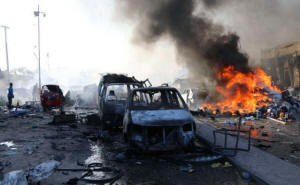|
Death toll from Somalia bomb attacks tops
300
 Send a link to a friend
Send a link to a friend
 [October 16, 2017]
By Abdi Sheikh [October 16, 2017]
By Abdi Sheikh
MOGADISHU (Reuters) - More than 300 people
died after twin bomb explosions in Mogadishu, an official said on
Monday, as locals packed hospitals in search of friends and relatives
caught up in Somalia's deadliest attack in a decade.
The death toll has steadily risen since Saturday, when the blasts - for
which no organization had claimed responsibility by Monday morning -
struck at two busy junctions in the heart of the city.
"We have confirmed 300 people died in the blast. The death toll will
still be higher because some people are still missing," Abdikadir
Abdirahman, the director of the city's ambulance service, told Reuters
on Monday.
Aden Nur, a doctor at the city's Madina hospital, said they had recorded
258 deaths while Ahmed Ali, a nurse at the nearby Osman Fiqi hospital,
told Reuters five bodies had been sent there.

Nur said 160 of the bodies could not be recognized. "(They)were buried
by the government yesterday. The others were buried by their relatives.
Over a hundred injured were also brought here," he told Reuters at the
hospital.
Some of the injured were being evacuated by air to Turkey for treatment,
officials said.
Locals visiting their injured relatives or collecting their bodies
filled every available space in Madina hospital.
"My last time to speak with my brother was some minutes before the blast
occurred. By then he told me, he was on the way to meet and was passing
at K5," Halima Nur, a local mother, told Reuters, referring to one of
the junctions that was struck.
"I am afraid he was among the unrecognized charred bodies that were
buried yesterday. I have no hope of getting him alive or dead. But I
cannot go home."
DEADLIEST SINCE INSURGENCY BEGAN
Saturday bomb attacks were the deadliest since Islamist militant group
al Shabaab began an insurgency in 2007.
[to top of second column] |

A general view shows the scene of an explosion in KM4 street in the
Hodan district of Mogadishu, Somalia October 14, 2017.
REUTERS/Feisal Omar

Neither it nor any other group had claimed responsibility, but al
Shabaab, which is allied to al Qaeda, stages regular attacks in the
capital and other parts of the country.
The group is waging an insurgency against Somalia's U.N.-backed
government and its African Union allies in a bid to impose its own
strict interpretation of Islam.
The militants were driven out of Mogadishu in 2011 and have been
steadily losing territory since then to the combined forces of AU
peacekeepers and Somali security forces.
But Al Shabaab retains the capacity to mount large, complex bomb
attacks. Over the past three years, the number of civilians killed
by insurgent bombings has steadily climbed as al Shabaab increases
the size of its bombs.
Some of those seriously injured in Saturday's bombing were moved by
ambulance to the airport on Monday morning to be flown to Turkey for
further treatment, Nur added.

Workers unloaded boxes of medicine and other medical supplies from a
Turkish military plane parked on the tarmac, while Turkish medical
teams attended to the cases of injuries moved from the hospital for
evacuation.
(Writing by Duncan Miriri; editing by John Stonestreet)
[© 2017 Thomson Reuters. All rights
reserved.]
Copyright 2017 Reuters. All rights reserved. This material may not be published,
broadcast, rewritten or redistributed. |